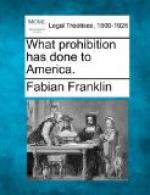in one of our leading newspapers and written evidently
by a man of education as well as sincerity. He
speaks bitterly of the proposal to permit “light
wines and beer,” and asks whether any one would
propose to permit light burglary or light arson.
That man evidently regards indulgence in any intoxicating
liquor as a crime, and he looks upon the law as a prohibition
of that crime. And he is essentially right, if
the law is right. For while the law does not
in its express terms make drinking a crime, its intention—and
its practical effect so far as regards the great mass
of the people—is precisely that. The
people President Angell had in mind when he implored
the young Yale graduates not to be like them, are
not makers or sellers of liquor, but drinkers of it.
They are not moonshiners or smugglers or bootleggers;
they are the people upon whose patronage or connivance
the moonshiners and smugglers and bootleggers depend
for their business. And everybody knows that,
in their private capacity, Senators and Representatives
and Legislaturemen are precisely like their fellow-citizens
in this matter. They may possibly be somewhat
more careful about the letter of the law; they are
certainly just as regardless of its spirit. With
the exception of a comparatively small number of genuine
Prohibitionists—men who were for Prohibition
before the Anti-Saloon League started its campaign—they
would laugh at the question whether they regard drinking
as a crime. And they act accordingly. What
degree of moral authority can the law be expected
to have in these circumstances? Upon the mind
of a man intensely convinced that the law is an outrage,
how much impression can be produced by the mere fact
that it was passed by Congress and the Legislatures,
when the real attitude of the members of those bodies
is such as it is seen to be in their private conduct?
How much of a moral sanction would be given to a law
against larceny if a large proportion of the men who
enacted the law were themselves receivers of stolen
goods ? Or a law against forgery if the legislators
were in the frequent habit of passing forged checks?
It happens that the receiving of stolen goods or the
passing of forged checks is a crime under the law,
as well as the stealing or the forgery itself; and
that the Prohibition law does not make the drinking
or even the buying of liquor, but only the making or
selling of it, a crime; but what a miserable refuge
this is for a man who professes to believe that the
abolition of intoxicating liquor is so supreme a public
necessity as to demand the remaking of the Constitution
of the United States for the purpose! Not the
least of the causes of public disrespect for the Prohibition
law is the notorious insincerity of the makers of
the law, and their flagrant disrespect for their own
creation.
CHAPTER VI
The law enforcers and the law




